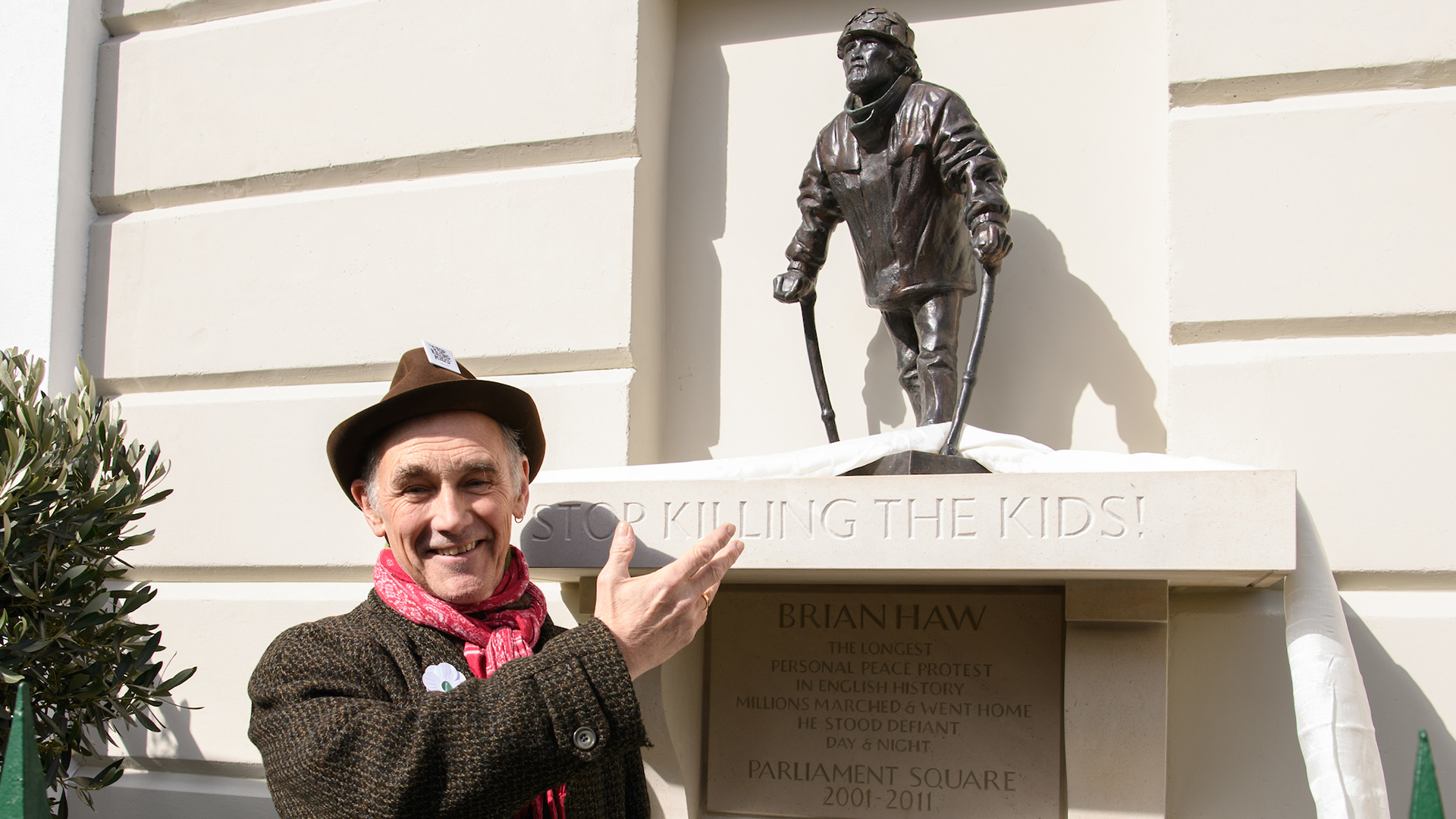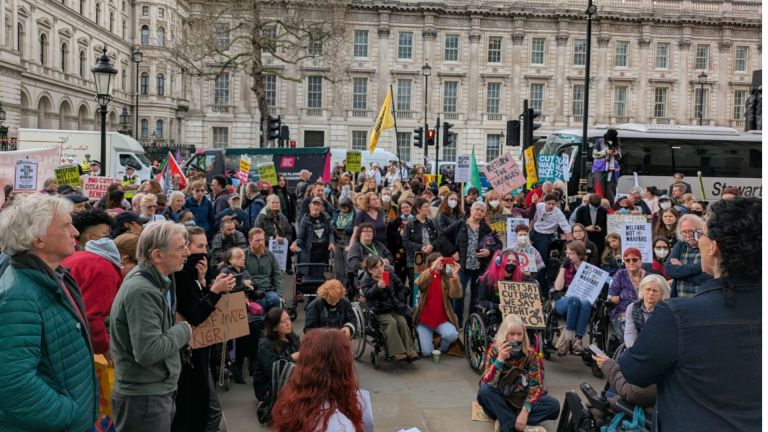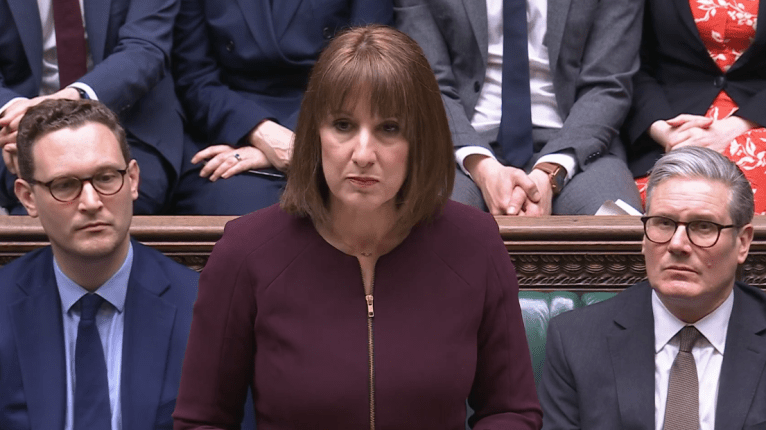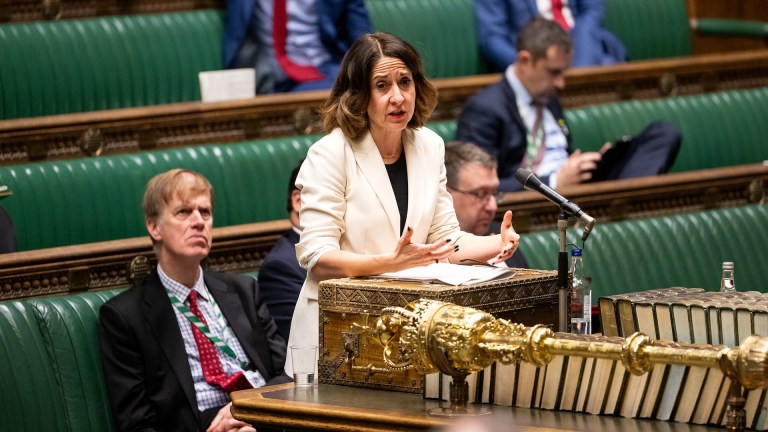Get the latest news and insight into how the Big Issue magazine is made by signing up for the Inside Big Issue newsletter
What are your own memories of Brian Haw?
I remember him mostly late at night. I would ride my bicycle home after acting in the West End and often stop to chat with him. He was friendly, direct, sometimes agitated by the authorities’ continual efforts to remove him or the physical and verbal aggression of those opposed to him. He usually had some new horrific aspect to share of England’s involvement in wars. Depleted Uranium for instance, used in ‘bunker buster’ bombs and leaving behind a radiation that causes birth defects, and will do for 50,000 years.
Living with statues as neighbours on Parliament Square, would he have found motivation from or felt frustrated by some of those figures?
When he required sticks and a Zimmer frame to stand in his last years, he was amused by his similarity to Churchill’s statue. Would he have drawn inspiration from the statues? Certainly not Churchill who allowed an estimated three million Indians to starve at the end of the war rather than share the food passing by on its way here from Australia. Food I am told we did not require. Gandhi, I would imagine he did admire; Mandela. Of course, there was no question when we asked to place Brian’s small statue somewhere in Westminster Square in honour of his historic stand for international peace. Absolutely not.
Who does Britain tend to turn into statues and why?
I see an improvement in who we remember in stone and bronze and marble. Military commanders, kings and queens, who have stood around for hundreds of years are now being joined by Oscar Wilde, other poets, and artists and slowly, too slowly, named women. At present only 15% of statues dedicated to a specific person remember a woman compared to 75% for a man. Amy Winehouse, the philanthropist Catherine Booth, activists like Emmeline Pankhurst, writers like Agatha Christie, stand now in our streets and squares. Of course, royals, from Boudicca to Princess Diana. Art UK found there were twice as many statues in London depicting animals than those for named women. So, the improvement is slow. The survey found just two women of colour: the Crimean War nurse Mary Seacole and the WWII secret operative Noor Inayat Khan. Some would remove all statues from our landscape, but I love the art of sculpture and value the historical reminder of where we have come from, even the cruellest times of empire, slavery, and colonisation. We mustn’t forget. Our DNA doesn’t.
Advertising helps fund Big Issue’s mission to end poverty
Where does Brian Haw’s statue stand?
Brian stands in bronze facing the Imperial War Museum. Our hope is that some of the many children visiting the museum of Imperial War, busloads, will notice his protest and eternal call to protect them. Perhaps they will be encouraged not to accept without question the huge grey naval guns that greet them as they turn into the grounds of the former mental hospital, Bedlam, now the IWM. If they cross the street and look more closely, they will learn that Brian stands on the wall of an old hospital for traumatised soldiers of WWI. To my mind WWI was the greatest betrayal of sons and daughters by their fathers and grandfathers that I know of. Who among us would not have sat down with our enemies to find a different way forward after just one of those battle days where a million young men and boys slaughtered each other and broke the hearts of even more mothers and daughters. This spirited wall has been generously donated by the present occupant, Jenny Tiramani, director of the School of Historical Dress.
What would he have thought of becoming a statue?
Would Brian have liked the idea of a statue? I didn’t sense he was interested in his own fame. He always seemed totally focused on his cause, Peace. But he clearly had an ego like any of us, maybe stronger? He used his mind and body, sacrificed them, as many brave soldiers believe they are doing, for Peace. I hope he will approve of our small effort to sustain that cause.
Do we need the spirit of Brian Haw today?
Brian reminds me of what is possible. He reminds me of all the inspiring protests I have witnessed and taken part in since the 1980s. From the anti-apartheid stand outside the South African Embassy and Greenham Common, to the beautiful gatherings of Extinction Rebellion in recent years. Of course, Stop the War, and the incredible, popular uprising against Tony Blair’s proposed Iraq war was an extraordinary day. What a different world we would be in if he had listened? Where is all the “security” he promised us as countless other politicians have continued to promise whenever they try to frighten us into war and aggression? It’s the oldest promise in the gangster guidebook!
Advertising helps fund Big Issue’s mission to end poverty
Given the forces that are emerging in the world, how can we not become overwhelmed and despondent?
Though we still have more rights of protest than many human beings in other nations, the authorities are trying to make protest in our streets and squares much more difficult. Brian Haw must stand now outside the radius of forbidden space around our Houses of Parliament. This alone shows the validity and strength of protest.
It’s very easy to lose confidence and faith in change for the good, isn’t it. I do regularly. To feel powerless and separate from each other. Community, our sense of communal life, our sense of considering our neighbour as ourselves, including our animal neighbours and plant neighbours, is where hope and joy can be found. It is also, I believe, where real democratic government will emerge in the citizens assembly movement. I have great hope for the future when I look at what citizens’ assemblies have achieved in Ireland, in France, and what they could achieve here and internationally on the issue of climate change.
Like so many obstacles to human love and life – racism, sexism, ignorance – our addiction to consumption is systemic. What if a new system of governance were possible, where politicians and business leaders did not set the policies?
Recently, the world’s first ever global citizens assembly on the climate and ecological crisis was formed. For the first time ever, the vast majority of the human population could finally be at the absolute heart of the conversation and steer appropriate action. Liberated from the influence of the church, liberated from the influence of corporate business, which has replaced the church, liberated from the un-representational election rituals. This is the conversation that we have been waiting for. It is the human family, each one of us, who will lead us out of this consumptive chapter in human history.
What lessons could we learn from Haw about how we should express our views?
Advertising helps fund Big Issue’s mission to end poverty
Persistence. Conscience. Faith in our conscience, time to listen and understand it, courage to act on the whispering of our conscience. Perseverance. During the pandemic I tried to inspire the creation of a National Nature Service, The NNS. A wise man who protects forests and wilderness in Scotland told me I needed to think like a tree if I wanted to work with them, if I wanted to serve nature, not in days and hours but years, decades, centuries.
How do you protest?
How do I rebel now? By trying always to love and understand my perceived enemies. To work towards forgiveness. Tolstoy believed it was the only true revolution, the only revolution that really worked. I think he was right.
Do you see light at the end of the dark tunnel we seem to have entered? Any message of hope welcome!
Brian’s father witnessed the horrific death camps of the fascists in Germany. He took his own life after the war when Brian was a young man. Brian knew first-hand the wide, long-term effects of trying to resolve our differences with violence. There is no security in weapons and strategies of war. With civilians composing 90% of casualties in worldwide war, there isn’t much honour either. Only through the development and insistence on peaceful resolution of conflict and much greater diplomatic care and investment to preserve community at all levels and resolve differences before they become toxic, can we live in peace. These objectives are within our reach as a people. The research has been done. The finance we waste on weapons of war could be re-directed. Our language and culture are far reaching.
“Hold your hand, my lord!” he says. “I have served you ever since I was a child,
But better service have I never done you, Than now to bid you hold.”
Advertising helps fund Big Issue’s mission to end poverty
Brian Haw bid our governors hold their violent hands for 10 years, day and night, 24 hours a day, 365 days a year. We can be proud to be brothers and sisters of his honourable soul. His is the longest sustained individual protest in the history of our land. Many stood around him, Peace Direct, Stop the War, Peace Pledge Union, Peace One Day, the Quakers, CND, Conscience, to name but a few of the communities working tirelessly for peace. Get involved. Don’t let yourself be isolated and disempowered by the news.
“Stop Killing the Kids.” It’s the law in our homes, our places of work, our streets. Let’s make it the law in our international relationships. No weapons, no assistance, no nothing, to any adult or group of adults who endanger, kill, or maim children to resolve their conflict. No exceptions. Let’s make England great again by making it a small part of the international community. Let England be the Brian Haw of Nations. Standing alone day and night against all forms of bullying, a singular voice of conscience. “Stop killing the kids.” That would be a light at the end of the tunnel that many would move towards with relief and hope.
Do you have a story to tell or opinions to share about this? Get in touch and tell us more. Big Issue exists to give homeless and marginalised people the opportunity to earn an income. To support our work buy a copy of the magazine or get the app from the App Store or Google Play.










